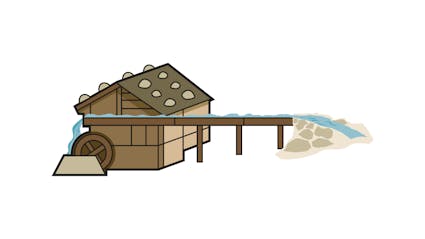694 – Linseed Crusher from Medel GR, 18th Century
It was a mill in the 18th century as the flour drawer, a wooden gear for power transmission and a millstone attest.

Restructuring
A small hut built in timber frame style stands on a low quarrystone base. It was a mill in the 18th century as the flour drawer, a wooden gear for power transmission and a millstone attest. Around 1930 it was rebuilt: this former mill in the Fuorn hamlet near the Lukmanier road became a stamp mill.

New Inner Life
A new mechanism and new devices had to be acquired: the water wheel now drove a horizontal shaft with cam pegs. These lifted a stamp ram up which then dropped and broke up stalks of hemp and flax – a job that otherwise had to be laboriously done by hand before further processing to textile raw material. At the same time and in the same space, the same rapidly rotating boom lifts with two further cam pegs a pair of linseed-crushing stamp pestles which then alternately drop into cupped hollows in a wooden block and crush linseeds.

Oil for Paint
After being crushed, the linseeds were vigorously heated on a stove, placed in linen bags and the oil pressed out in the adjacent oil press. The oil for making paint then ran out. Linseed oil also served as fuel for lamps and in home medicine. It was rarely used for cooking. The pressed seed cake was fed to the livestock.
Rural Industry
Smithing, fulling (compaction of cloth) or milling – there was a surprising variety of trades out in the country. In nearly every region there were ten or a dozen different workshops in action. Sometimes they required specific skills like hide tanning, sometimes it was an elemental installation like a community bake house.
Ballenberg
Swiss Open-Air Museum
Museumsstrasse 100
CH-3858 Hofstetten bei Brienz
Opening hours Administration
3 November 2025 to 8 April 2026
From Monday to Friday
8.30 am to 11.30 am
1.30 pm to 4.30 pm
Opening hours
9 April to 1 November 2026
10 am to 5 pm daily